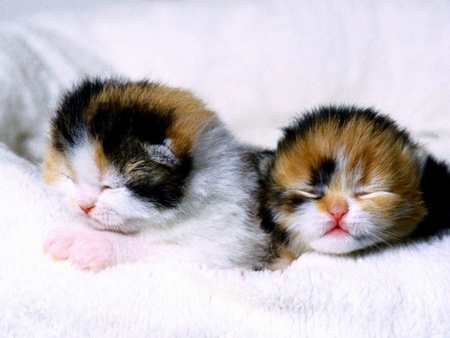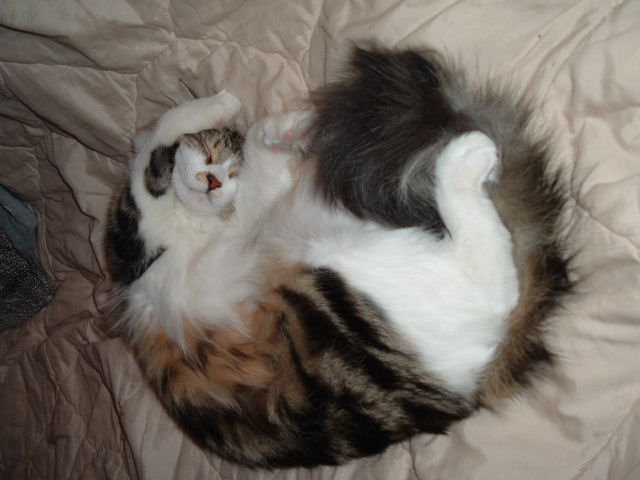Just as newborn babies require a series of vaccinations and booster shots, so do kittens and puppies. These vaccines are one of the most important ways to keep your kitten happy, healthy and safe.
A kitten who is six to eight weeks old should attend his first visit to the veterinarian. As kittens receive milk from their mothers, they are also receiving antibodies that help protect them against infectious diseases.
Once they reach the six to eight week age however, the kittens must receive vaccinations in order to build antibodies against these diseases on their own.
Upon this visit, your kitten will receive a thorough physical examination. In addition, a series of tests will be performed on your kitten to ensure he has not already contracted these diseases. Tests such as a fecal exam and a blood test will reveal any abnormalities. These tests are significant for detecting Feline Infectious Peritonitis, Feline Leukemia and Feline Immunodeficiency virus.
Whether your cat is an indoor cat or one who likes to venture outdoors, they should all receive vaccinations. At your kitten’s first visit, he will receive the first in a series of FVRCPC vaccines along with a de-worming medication. The vaccine protects your kitten from the illnesses rhinotracheitis, calicivirus, panleudopenia and Chlamydia.
When your kitten has reached eight to twelve weeks old, he will then require a second visit to the veterinarian. Upon this visit he will receive an additional FVRCPC vaccination along with an FIP and a FLP vaccination if he is at risk for these diseases and an additional dose of de-worming medication. If your cat is one that wishes to partake in the wilds of nature, most veterinarian’s recommend that a kitten receive a Rabies vaccination at this time as well.
The third visit to the veterinarian is recommended when your kitten reaches the age of ten to sixteen weeks old. He will receive a third dosing of the previous vaccinations and depending on the status of worm infestation, a possible third dose of de-worming medication. If you’re adventurous outdoor kitten was previously under the age limit for a Rabies vaccination, one will be administered at this time.
When your kitten has finally reached his one year birthday, he will require another visit to the veterinarian for a physical exam and another series of the previous vaccinations. The Rabies vaccination your kitten received earlier is good for one year. Upon the anniversary of that date, he will require another Rabies vaccination that will then be good for three years. It is recommended by veterinarian’s that cats return each year for a booster injection for the FVRCPC as well as a physical checkup.
As with all vaccinations, there are some risks of potential side effects. The Feline Leukemia vaccine has been shown to occasionally cause a form of cancer at the site of the injection. For this reason, veterinarians do not typically recommend this vaccine unless your cat is at risk.
Other possible side effects include a growth at the injection site, which if caught in time can be removed before it has a chance to spread. Protecting your feline companion from dangerous and infectious diseases may have a few rare side effects, but when weighed against the turmoil and heartache the actual disease can cause the vaccinations are well worth it.
A kitten who is six to eight weeks old should attend his first visit to the veterinarian. As kittens receive milk from their mothers, they are also receiving antibodies that help protect them against infectious diseases.
Once they reach the six to eight week age however, the kittens must receive vaccinations in order to build antibodies against these diseases on their own.
Upon this visit, your kitten will receive a thorough physical examination. In addition, a series of tests will be performed on your kitten to ensure he has not already contracted these diseases. Tests such as a fecal exam and a blood test will reveal any abnormalities. These tests are significant for detecting Feline Infectious Peritonitis, Feline Leukemia and Feline Immunodeficiency virus.
Whether your cat is an indoor cat or one who likes to venture outdoors, they should all receive vaccinations. At your kitten’s first visit, he will receive the first in a series of FVRCPC vaccines along with a de-worming medication. The vaccine protects your kitten from the illnesses rhinotracheitis, calicivirus, panleudopenia and Chlamydia.
When your kitten has reached eight to twelve weeks old, he will then require a second visit to the veterinarian. Upon this visit he will receive an additional FVRCPC vaccination along with an FIP and a FLP vaccination if he is at risk for these diseases and an additional dose of de-worming medication. If your cat is one that wishes to partake in the wilds of nature, most veterinarian’s recommend that a kitten receive a Rabies vaccination at this time as well.
The third visit to the veterinarian is recommended when your kitten reaches the age of ten to sixteen weeks old. He will receive a third dosing of the previous vaccinations and depending on the status of worm infestation, a possible third dose of de-worming medication. If you’re adventurous outdoor kitten was previously under the age limit for a Rabies vaccination, one will be administered at this time.
When your kitten has finally reached his one year birthday, he will require another visit to the veterinarian for a physical exam and another series of the previous vaccinations. The Rabies vaccination your kitten received earlier is good for one year. Upon the anniversary of that date, he will require another Rabies vaccination that will then be good for three years. It is recommended by veterinarian’s that cats return each year for a booster injection for the FVRCPC as well as a physical checkup.
As with all vaccinations, there are some risks of potential side effects. The Feline Leukemia vaccine has been shown to occasionally cause a form of cancer at the site of the injection. For this reason, veterinarians do not typically recommend this vaccine unless your cat is at risk.
Other possible side effects include a growth at the injection site, which if caught in time can be removed before it has a chance to spread. Protecting your feline companion from dangerous and infectious diseases may have a few rare side effects, but when weighed against the turmoil and heartache the actual disease can cause the vaccinations are well worth it.


 RSS Feed
RSS Feed